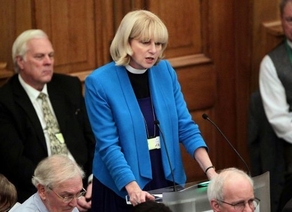
London (AFP) — The Church of England held an emergency session on Wednesday after a vote rejecting the appointment of women bishops that exposed bitter divisions in the worldwide Anglican communion.
The meeting of senior bishops in London came a day after the General Synod, the church’s governing body, narrowly voted against the move following years of wrangling between traditionalists and liberals.
Archbishop of York John Sentamu said there would be women bishops “in my lifetime”, but added that the church needed to find legislation to push through what would be its biggest change since allowing female priests 20 years ago.
The church will in theory not be able to even discuss the plans again for years — but a group of core bishops could give special permission to revive them as early as February.
“The principle has already been accepted by the General Synod. It has already been accepted by all the dioceses,” Sentamu told BBC radio.
“So what we need to do is find the legislation — 99.9 per cent of the legislation is there — it’s this little business of provision for those who are opposed.”
Outgoing Archbishop of Canterbury Rowan Williams — the spiritual head of around 80 million Anglicans around the world, who had strongly backed the introduction of women bishops — was due to give a speech after Wednesday’s meeting.
The vote was one final setback for liberal theologian Williams, who steps down in December after 10 years of battles to keep the church’s various factions united.
The result also appears to strike at the authority of his successor Justin Welby, the Bishop of Durham, a former oil company executive who was named just weeks ago.
Welby tweeted, “very grim day, most of all for women priests and supporters, need to surround all with prayer and love and cooperate with our healing God.”
The legislation needed a two-thirds majority among each of the three houses in the 470-member General Synod but fell short by just six voters among ordinary lay members of the church.
The bishops voted 44 in favour and three against, while two abstained (almost 90 per cent), the clergy voted 148-45 (almost 77 per cent), while the laity voted 132 in favour and 74 against (64 per cent).
The proposals would have allowed a woman bishop to delegate duties to a stand-in male bishop if a parish rejected her authority. Some who back women bishops voted against as they felt this plan was a messy compromise.
Around a third of the clergy in the Church of England are women.
But conservatives in the church welcomed the result, which they said would have avoided further splits between the Church of England and evangelical elements of the Anglican communion, especially those in Africa.
“We thank God that the Church of England has avoided making a big mistake which would have led to real division and a less inclusive church,” Rod Thomas of the evangelical group Reform said.
The Church of England will not formally be able to raise the plans again until 2015 when a new General Synod comes in.
But the “Group of Six”, a body which includes the church’s two archbishops, could give special permission to revive the initiative at the next Synod meeting, set for July — though an extraordinary one could be called in February.
A simple majority vote in the Synod would put the plans on the next meeting’s agenda.
Britain’s newspapers were on Wednesday unanimous in their criticism with The Times calling the vote “a terrible failure” that marked “a sad and shameful day” for the church.
The CofE, which separated from the Roman Catholic Church in 1534, claims that more than 40 per cent of people in England regard themselves as members.
The wider Anglican communion’s first woman bishop was appointed in the United States in 1989 and there are now 37 Anglican bishops worldwide, in countries including Australia, Canada, Cuba, New Zealand and Swaziland.
Victoria Matthews, the Bishop of Christchurch in New Zealand, said she was disappointed by the result.
“I still believe that there has been this isolated traditionalist group that has got more and more distant from the mainline of the church,” she told the BBC.



